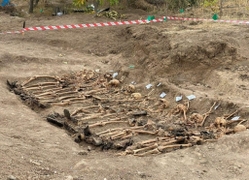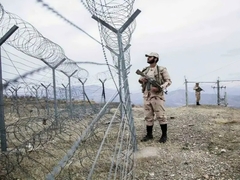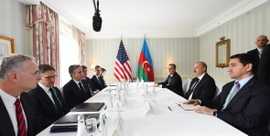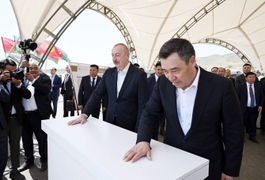Millions of Azerbaijanis celebrate today the third anniversary of the historic victory on November 8, 2020, ending the war in the country's Karabakh (Garabagh) region.
Three years ago, on this day, the Azerbaijani forces liberated the strategic Shusha city in the Karabakh region from a decades-long Armenian occupation. The city’s salvation was seen as the pinnacle of the Azerbaijani army’s weeks-long counter-attack operations, codenamed “Iron Fist.”
“Dear Shusha, you are free! Dear Shusha, we are back! Dear Shusha, we will reinvigorate you!” said President Ilham Aliyev on November 8, 2020.
Shusha was said to be one of the major strongholds of the Armenian occupying forces, who could not repel face-to-face battles with the Azerbaijani troops and retreated in disarray. Liberation of the city has had a crucial impact on the surrender of Armenia's forces and the signing of a tripartite statement on November 10, 2020.
On December 3, 2020, President Aliyev signed an order establishing November 8 as “Victory Day” in Azerbaijan.
The third anniversary of Victory Day on Wednesday started with solemn marches of the personnel of the Azerbaijani army in the cities and districts across the country. Azerbaijanis flocked to the Second Honorary Alley to pay homage to the memories of the fallen heroes of the 44-day Patriotic War. Various events, including flash mobs, concerts, and fireworks were held commemorating the historic victory.
The major parade of the Azerbaijani army personnel took place in the city of Khankendi, Karabakh region, with President Aliyev’s participation.
“Three years ago, the city of Shusha, the crown jewel of Karabakh, was liberated from the occupiers. A day later, the enemy army surrendered and waved the white flag. Thus, the Second Karabakh War resulted in a complete victory of the Azerbaijani state. This is a historic event,” President Aliyev said in a speech at a military parade held in Khankendi.
President Aliyev stated that restoring Azerbaijan’s sovereignty over the entire Karabakh region fulfilled the promise he made during his rise to power twenty years ago.
“Twenty years ago, both in the run-up to the election and during my swearing-in ceremony, I promised to my people that the day would come when we would raise the State Flag of Azerbaijan in every corner of the occupied lands. I remember saying five years ago, during the military parade held in the Azadlig Square in Baku in September 2018, that the day would come when the Azerbaijani flag would fly over all our lands that were still under occupation, and this day has come,” he said.
Armenia and Azerbaijan had been in an armed conflict for nearly 30 years over the Karabakh (Garabagh) region, which is an internationally recognized territory of Azerbaijan.
Armenia launched full-blown military aggression against Azerbaijan following the Soviet Union’s dissolution in 1991. The bloody war lasted until a ceasefire in 1994 and saw Armenia occupying 20 percent of Azerbaijan’s internationally recognized territories. Over 30,000 Azerbaijanis were killed, and one million were expelled from those lands in a brutal ethnic cleansing campaign conducted by Armenia.
Although the United Nations Security Council adopted four resolutions in 1993 demanding the immediate withdrawal of the occupying forces from Azerbaijani lands and the return of internally displaced Azerbaijanis to their ancestral lands, Armenia failed to comply with all four legally binding documents.
Armenia occupied Shusha on May 8, 1992. The city underwent an unforeseen policy of destruction by Armenians aimed at erasing Azerbaijan’s historical and cultural heritage. Shortly before the 2020 war, the illegal separatist regime established in the occupied Azerbaijani lands held a self-designed bogus “presidential inauguration” in the city.
On September 27, 2020, the decades-old conflict took a violent turn after Armenia’s forces deployed in the occupied Azerbaijani lands shelled military positions and civilian settlements of Azerbaijan.
During the counter-attack operations that lasted 44 days, Azerbaijani forces liberated about 300 settlements, including the cities of Jabrayil, Fuzuli, Zangilan, Gubadli, and Shusha, from nearly 30 years of illegal Armenian occupation. The war ended in a tripartite statement signed on November 10, 2020, by Armenia, Azerbaijan and Russia. Under the statement, Armenia also returned the occupied Aghdam, Kalbajar, and Lachin districts to Azerbaijan.
President Aliyev said the Second Karabakh War could have been prevented if the Armenian leadership had reciprocated his calls for the withdrawal of troops from the Azerbaijani territories.
“I have repeatedly told the leadership of Armenia that if you do not vacate our lands, you will face us on the battlefield. Whoever stands behind you, it cannot turn us away from our just cause. The 44-day Patriotic War showed this once again,” he said.
End of separatism - Restoration of sovereignty
Khankendi remained within the temporary monitoring zone of the Russian peacekeeping mission deployed in certain parts of the Karabakh region after the 2020 war.
Despite the legally binding demands on the withdrawal of the Armenian forces from the Karabakh region, the largest portion of the troops was stationed in Khankendi along with the other settlements, including Khojaly, Aghdara, Khojavand, and Asgaran. The peacekeepers have failed to enforce the withdrawal despite their relevant obligations.
Since 2020, the Armenian army formations committed dozens of provocations, causing loss of life on the Azerbaijani side.
Azerbaijan Armed Forces launched on September 19 local anti-terrorist measures to neutralize illegal Armenian armed formations and their military infrastructure in the Karabakh region.
The operation came on the heels of the intensifying attacks on the Azerbaijani positions and deadly mine incidents killing four police officers, two road construction workers, and two servicemen of the Azerbaijani army.
By the time of the cessation of hostilities, the Azerbaijani military disabled artillery systems, radio-electronic warfare, military equipment, ammunition depots, military strongholds, and shelters of the Armenian army formations stationed in the Karabakh region. In addition, more than 90 combat posts and strategically important positions of the Armenian military formations were taken under control during the one-day operation until September 20.
The Defense Ministry reaffirmed that only legitimate military targets were incapacitated as part of the counter-terrorist measures in the Karabakh region, while the civilian population and civilian infrastructure facilities were not targeted.
On September 20, the illegal separatist regime requested through the Russian peacekeeping command to cease the local anti-terror activities by agreeing to withdrawal and complete disarmament of the Armenian armed formations.
On September 28, the separatist regime in the Karabakh region announced self-dissolution and called on the Armenian residents of the Karabakh region to become acquainted with the conditions of reintegration presented by Azerbaijan, in order to subsequently make an independent and individual decision on the possibility of staying in (or returning to) the Karabakh region.
President Aliyev hoisted the state flag of Azerbaijan in Khankendi on October 15.


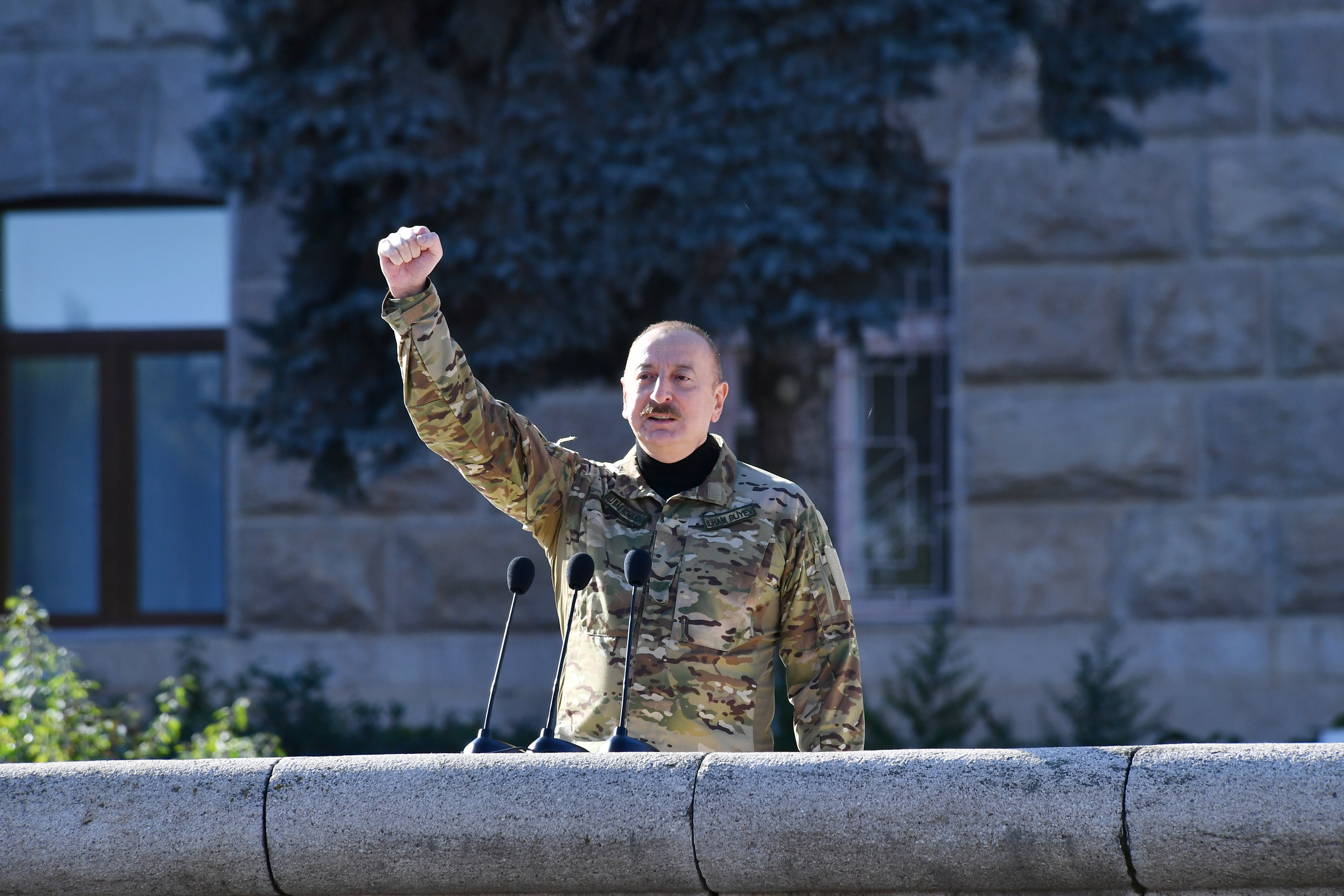




 President Ilham Aliyev shed light on the evolving contours of the peace process with Armenia during an international conference in Baku this week. ...
President Ilham Aliyev shed light on the evolving contours of the peace process with Armenia during an international conference in Baku this week. ...
 A draft resolution aimed at preventing the development and deployment of weapons of mass destruction (WMDs) in outer space, co-sponsored by Japan a...
A draft resolution aimed at preventing the development and deployment of weapons of mass destruction (WMDs) in outer space, co-sponsored by Japan a...
 The Iranian and Cuban transport ministers have discussed expanding maritime and air transportation cooperation.
The Iranian and Cuban transport ministers have discussed expanding maritime and air transportation cooperation.
